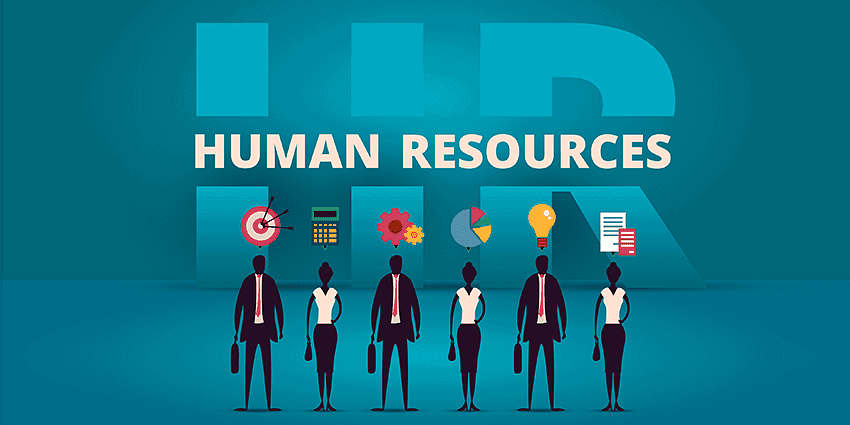The beginners guide to human resources in detail. This post is for you if you're interested in learning more about HR. After reading the article, you will be familiar with the functions and duties of human resources in a business and have answers to some frequently asked questions.
Overview: The beginners guide to human resources

A firm is made up of many components. Making an organization run effectively requires daily management of operations, finances, marketing, and employee relations.
They are frequently all handled by one person or a small group of persons in SMEs. In larger businesses, each department has a specific area of responsibility.
The Human Resources (HR) department is one of the most important parts of every firm, regardless of size. Any firm needs the duties and obligations that fall under the HR department's purview. However, a lot of experts don't actually comprehend how HR works.
Certain business practices are self-evident. Warehouse management focuses on how your warehouse is set up and run. It's not too difficult to comprehend that. When asked to define HR, most people will probably include recruiting and firing. That only touches the surface.
Understanding what HR is, what it does, and why you might need to pay it more attention will be made easier with the aid of this HR guide.
Read more: What Is An Advantage Of Hiring Contingent Workers?
What is human resources?

"Human resources" is used to refer to both the employees of a business or organization as well as the division in charge of overseeing all employee-related issues.
In the 21 century, HR is critical to helping businesses adapt to a business climate that is changing quickly and to the increased demand for qualified workers.
At this point, you could be thinking that's pretty much everything. Not too far off the mark, really. Nearly every area of an employee's actions will be impacted by the responsibilities of an HR professional.
The depth and complexity of the HR profession account for why so many individuals are unable to comprehend what it is.
But it's also because of this field's breadth that HR is so essential to every firm. You need to gain a deeper understanding of the industry to take charge of HR at your company. Investigating the main duties involved is the greatest method to get to know HR.
Types of human resources
An HR Department handles a wide range of crucial human resources tasks. These duties may fall under one of five well-known categories.
- New employee recruitment, hiring, and onboarding.
- Taking care of employee salaries and perks.
- Providing for the professional growth of employees.
- Individual workers' work-related difficulties are addressed.
- Creating policies that have a company-wide impact on the working environment.
Key Activities
- Utilizing and managing people well.
- Attaching competencies to performance evaluation and remuneration.
- Acquiring skills that improve performance on both a personal and organizational level.
- Innovating, being more inventive, and being more adaptable are all important for competitiveness.
- Applying fresh methods to career development, succession planning, work process design, and inter-organizational mobility.
- Utilizing better staffing, training, and employee relations to manage the adoption and integration of technology.
Read more: Employee Turnover Vs Attrition
What does HR do?

There is more to the term "Human Resources" than meets the eye. The phrase has to do with overseeing a company's personnel.
The company's most important resource is frequently its personnel. HR is also there to help and assist employees. It is an essential tool for them in their daily work. The field has a catchy name.
The 3 main missions that an HR professional or department performs are listed below. Together, they enable HR to oversee and assist with staff management. Here is the beginners guide to human resources.
Find and hire new employees
Recruiting.
Finding competent people for open jobs inside the company and taking the necessary measures to screen them for hire are both parts of the recruiting process.
HR specialists may participate in the hiring process by writing and publishing job descriptions, looking for qualified candidates to apply for open positions, vetting applicants, and conducting interviews. This duty is very important for an organization's workforce development.
Interviewing
After manually or automatically sorting through resumes, recruiters go on to the next stage—interviews—where they should ideally sit down and get to know the most qualified applicants. Therefore they can make better decisions about them and the management of the business.
The interviewing process is a fundamental science in and of itself, and how to maximize it is a topic worthy of a whole book.
Be upfront and ask questions to keep things simple and clear. Consider whether the individual in front of you is qualified for the role in terms of experience, knowledge, abilities, and personality.
Achieve effective performance management
Make payroll
Processing payroll is another duty of HR. Each business has a different idea of what this implies. But even at smaller, simpler businesses, it might include everything listed below:
- Recording the hours worked
- Salary payments
- Tax calculation
- Paying back expenses
- scheduling payments and managing changes
- Handling pay hikes and bonuses
In a big business, this HR department alone can employ a group of people full-time.
Payroll processing can be difficult and time-consuming. For this reason, the majority of HR specialists have a thorough understanding of tax and salary legislation. Additionally, they must be informed about any amendments to these laws. A payroll checklist is necessary.
Payroll processing needs to be extremely accurate. The government may impose fines or enraged personnel as a result of any error. Due to this, many businesses hire specialized agencies to handle their payroll.
Payroll outsourcing offers businesses the assurance that their employees will be paid correctly and on schedule. Additionally, it allows HR specialists to concentrate on other activities.
Promoting a secure workplace
Human resources have a crucial duty to ensure workplace safety. The Occupational Safety and Health Act of 1970 (OSHA) requires companies to create a safe working environment for all employees, and human resource professionals will assist this mandate by supervising and conducting safety training, keeping workplace injury logs and reporting, and addressing any worker's compensation issues that may occur.
Establish, manage employee benefits
HR's responsibilities extend beyond pay, expenses, and bonuses. Another area that the diversified department is in charge of is employee benefits. Choosing the benefits to provide and managing their administration fall within this category.
It's important to provide the correct benefits to employees. It might determine whether a candidate chooses your company or goes with another one.
Promising candidates frequently take a lower-paying position if it comes with greater benefits. After all, their finances may be significantly more actually impacted by their health or dental coverage.
Promote health and happiness
The overall health and happiness of your personnel is another duty of your HR department. It's a crucial yet frequently undervalued component of human resources.
Making sure workplaces adhere to safety requirements is part of their responsibility in this regard. Aiding staff members who are experiencing health problems is also included.
For assistance with serious or persistent conditions, employees can contact HR. That covers both complaints about one's physical and mental health.
Employees' conditions will be managed with the use of human resources. Staff members can receive the care they require and receive the proper support at work with the aid of HR.
Create & Manage Training
For many employees to adequately perform their duties, training is necessary. It is necessary to train new hires or personnel in new jobs on their responsibilities and the proper procedures to follow.
The heavy burden of this training rests once again on the shoulders of HR experts. HR might need to create in-depth courses for new hire training. It may also be necessary to enlist current employees to assist with the training.
Internal promotion is a great strategy for many companies. If you do promote a worker to management, they could require further training.
HR can arrange for spaces on outside retreats or training courses. For employees who leave work to attend, the department can also set up coverage.
Follow up on employee satisfaction
HR is concerned with handling significant issues as well as general job satisfaction. The most successful organizations' workforces are pleased and thrilled to go to work in the morning. The achievement of such a degree of satisfaction at your company is another responsibility of human resources.
There are numerous approaches for HR professionals to improve employee satisfaction. A good example is offering distinct career growth routes.
Many employees will be considerably pleased if they realize they may still improve in their current position. Another option that is well-liked by workers is educational assistance or vocational training. People feel more accomplishment and personal progress at work as a result.
Conduct Investigations
In any business, things don't always run smoothly. All workforces struggle with issues. These situations call for competent and suitable handling. HR receives complaints and reports of issues.Then HR need to conduct Investigations.
Professionals in human resources must look into any allegations of impropriety. That could be a worker's grievance against a fellow employee. It could also be a complaint about unfair treatment by the business.
Disciplinary actions are an important part of HR. An organization's ability to function smoothly depends on how complaints are handled. At work, employees must feel secure and at ease. They must also be held accountable for not upholding business standards at the same time.
Keeping records
You may have noticed that we have talked a lot about paperwork so far. There is a ton of paperwork and documentation around HR activities. The department's ultimate responsibility at your company is to preserve all of the records generated.
HR should keep documents including applications,benefit plans or payrolls. These documents support their daily operations.
They might also be necessary to demonstrate that your business complies with rules unique to the sector. Speaking of which, you may be compelled by law to maintain some job records depending on your area.
Develop a good corporate culture
Encourage Good Relationships
Not all aspects of human resources are administrative and practical. The department is also in charge of your company's partnerships.
That includes interactions between coworkers as well as the bond between staff members and the business. Planning team building activities is one of the things to improve relationships.
The success of a company may depend on effective relationship management. A happy workforce is fostered by positive interactions and considerate treatment of employees.
When compared to unhappy employees, happy workers frequently produce more. Additionally, a business that mistreats its employees may be held accountable through the legal or financial system.
When Should You Pay More Attention to Human Resources?

If you didn't already, you should now understand how important HR tasks are to your company. Whatever your niche is and how far your company has progressed, HR requires time and attention.
Owners or managers of the smallest businesses may perform the tasks individually. However, many organizations will require a specific HR department or professional. The four situations listed below may need you to concentrate more on HR.
Scaling of Your Company
If you had a brand-new company, it's possible that you hadn't given human resources much thought at first.
You probably took on related activities but considered them to be a normal part of business operations. HR needs to be prioritized when scaling up your business and attempting to achieve sustainable growth.
An expert in human resources can assist you in making the best recruiting decisions. They'll be able to spot the talent gaps in your company and know the best way to close them.
HR may also monitor the performance of your expanding workforce. As your business grows, you will be less able to do it on your own.
Current HR Organizations are Overburdened
Even if your company doesn't have a specific HR manager or department, HR responsibilities still exist. It's likely that you either take care of them yourself or turn to one of your team members. Because of this, they have less time for their other jobs because of their human resource responsibilities.
HR tasks and responsibilities increase as a business grows. Whoever is in charge of the chores will eventually begin to devote most of their time to them. Now is the time to bring on board a committed HR specialist. Overall productivity will increase, and all HR issues will be properly resolved.
Law and regulation are evolving quickly
Regulation and law both change quickly. This is especially true of workplace and employment laws. No matter what sector you work in, you have legal obligations to your employees. These expectations carry serious penalties for non-compliance.
You don't want your company to be caught off guard when new regulations go into effect. Maintaining compliance with this legislation could slip through the cracks with all the other demands on your time.
The void can be filled by an obedient HR manager. They will be responsible for keeping your company compliant by keeping track of changes to employment law.
People Also Asked
How do I get into human resources with no experience?
Starting as a recruiter at a staffing firm is a common way to start into human resources without prior experience.
What does HR do all day?
In the simplest terms, the HR (Human Resources) department is a team in charge of managing the employee life cycle, including hiring, onboarding, training, and terminating employees, as well as handling benefit administration.
Is HR a high burnout job?
According to Forbes, 98% of HR workers are burned out as a result of workplace reforms and the Great Resignation, according to a survey. As workers grappled with remote and hybrid working transitions, a clear pattern of employee burnout arose during the last 18 months.
Wrap up
The most well-known and least understood area of business is human resources. HR is a term that everyone has heard of, but few people truly grasp what it comprises. Your ability to buck that tendency is now improved by having read our guidance.
Success and failure can be determined by how much attention is given to HR. The best staff can be assembled and kept happy and engaged with strong HR. Additionally, it guarantees that your business won't violate any laws or rules that might be disastrous.
If your firm is expanding and you don't already have a human resources management team, make sure you get one.
If you are a human resources manager, encourage your organization to conduct the processes and procedures listed above correctly. They serve as the foundation for creating an organization with a positive work environment and high output.
It is not a waste of money to spend in human resource management; rather, it is cash used to head off issues before they arise. Explore the steps and procedures covered in this article and give them some thought as you develop your future strategy.
Call Tanca if you have any questions or require immediate assistance. To share your experience with the readership, please leave a comment.






